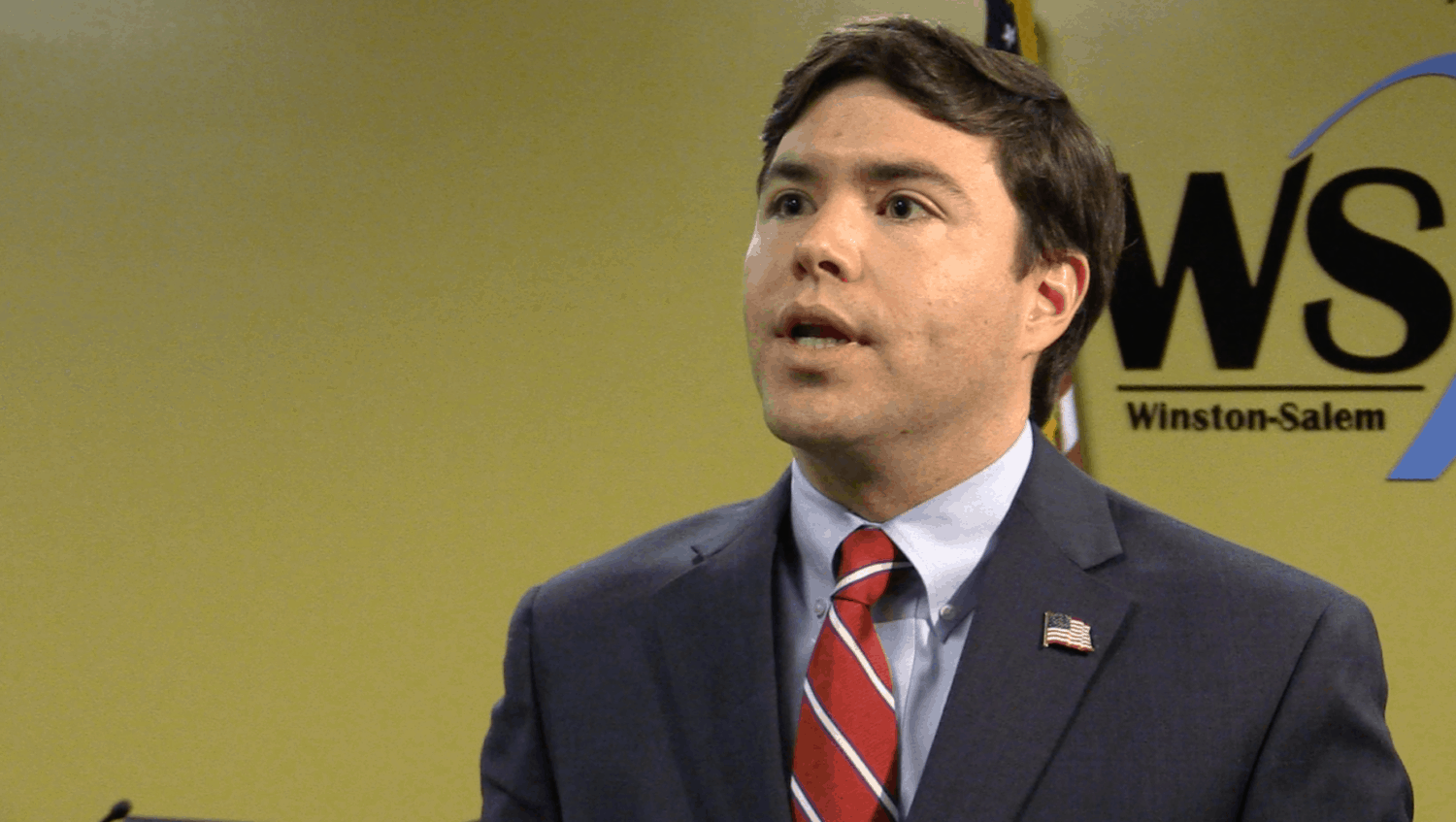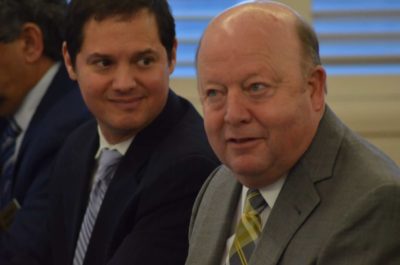Superintendent Mark Johnson went to Winston-Salem last Friday for the first stop on his statewide listening tour. He visited Glenn High School, the Innovation Quarter, and he met with business leaders.
After his trip to the school and meeting with business leaders, he met with reporters to discuss what he learned.
He began by talking about Glenn High School, which up until this year had received School Performance Grades of D. The second year, the school was close to getting a C, but didn’t quite make the cutoff. Johnson said staff went into high gear to increase performance.
“I was talking to the principal at Glenn High School and he said, ‘At that moment, we all told ourselves, we are not a D high school,'” Johnson said.
He said the school changed policies and concentrated on professional development.
“The reason I’m on a listening tour is because when you truly listen to what is going on in our schools, you will always learn something new that works,” Johnson said.
One thing the school noticed is that high school teachers don’t necessarily have the skills to teach reading to students who are behind. So the principal got professional development focused on reading skills for teachers.
Johnson also talked about meeting with business leaders and hearing about the struggles they face when finding properly skilled employees.
He said business leaders want schools to start letting kids know their options at a younger age, including vocational professions. Johnson said that any student who wants to go to college can, but they need to know there are other options.
For instance, he said that a student should know that he or she could become a lineman for a power company after high school, and within a few years he or she could be making more than $100,000. Or a student could graduate and work as a welder at a steel fabrication company and potentially be making $70,000.
“These are options that the business community wants students to know,” he said.
He also talked about IBM’s Watson and Watson’s Teacher Advisor. He said the program uses Watson’s cognitive ability in such a way that teachers can type in questions and Watson can tell them answers that they could use to solve education issues in the classroom. Additionally, Watson could also suggest lesson plans or materials for the teachers.
“I’m not going to say this is the magic bullet,” he said. “I’m encouraging teachers to go try this, use this, it’s free.”
He encouraged teachers to keep in touch with him via his new Facebook page. There they can tell him what’s working in schools and what’s not, and he said he would be particularly interested in hearing about teachers who sign up for and use the Watson Teacher Advisor.
See Johnson’s prepared remarks below:
After his prepared remarks, Johnson took questions from the press.
When asked about news that average teacher salaries had fallen short of the $50,000 mark predicted by members of the General Assembly and former Governor Pat McCrory after they passed a teacher pay raise during the short session last year, Johnson said he hoped it wouldn’t become a big issue, especially since the average teacher salary was only a little short ($49,837) of the goal.
“I would hate for that to just be a political talking point,” he said.
He said he supported the General Assembly’s overall plan to get teacher pay up to $55,000, and he said he would help them do that.
When asked for an example of what he considered outdated about the current public school system — a complaint he made on the campaign trail for Superintendent — he cited support for classroom teachers.
“Right now, we have a system that was designed in the 20th century, the industrial age,” he said.
The conventional approach is to expect a teacher to teach an average student in an average classroom, he said. But we now know that there is no such thing as an average student, he said. Teaching must be individualized, and he said he hopes technology will make that happen.
When asked about his support for President Donald Trump’s nominee for national Education Secretary, Betsy DeVos, Johnson said that she supports students first.
“She puts students over a system that has been doing the same thing for 100 years. If we support students, we must naturally support teachers, because all learning occurs in the classroom,” he said.
He went on to add that if schools do what’s right for students, they will be doing what’s right for teachers.
The final confirmation vote on DeVos is expected today.
When asked about the number of people who have recently announced they are leaving their jobs at the state Department of Public Instruction, Johnson said that he is working under the previous law, which is now in effect, to find replacements.
Currently, the State Board of Education is engaged in a lawsuit over legislation passed during a special session in December that transferred some of the State Board’s power to the Superintendent. There is a temporary restraining order in place halting the transfer until a court can decide the case. The hearing is supposed to start June 29.
The court challenge involves, in part, the Superintendent’s powers to appoint and dismiss senior staffers at DPI. With the restraining order in place, Johnson would have to bring any possible replacements for those who’ve announced their departure before the Board for approval.
Johnson was asked why he thought the Superintendent should be the top educator in the state rather than the State Board of Education. He said he is more accountable to voters.
“I was the one who was on the statewide ballot. People went and voted for the office of the state Superintendent. I campaigned across this entire state,” he said.
Johnson also said he will be working on his own legislative agenda, separate from the agenda of the State Board of Education, though he did say there will be a lot of similarities between the two.
One area he wants to emphasize in his agenda is workforce development.
“Just cause a student isn’t on track for college doesn’t mean they’re not on track for success. It is past time that we say every student must be prepared to go to college. We must say they must be prepared for success,” he said.
Former Superintendent June Atkinson said that during her tenure, she never had her own legislative agenda.
When asked about his campaign promise to reduce testing, Johnson said he has to wait and see what federal regulations come down on the subject. When he has those, he said he will look at the state’s plan for the federal Every Student Succeeds Act and see what is possible.
See the full question and answer session below:



